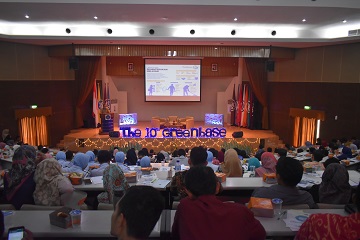IPB Professor: Indonesia Has Not Optimally Managed the Potential of Blue Blooded Crabs That are Useful to NASA

Resource and Environmental Economics Student Association (REESA) Department of Resource and Environmental Economics (ESL) Institute of Agriculture (IPB) held a seminar on the 10th Greenbase. This seminar is a series of Greenbase are taught by professional associations REESA. The 10th Greenbase series of activities starting with the Environmental Action program in the form of mangrove planting on May 13, 2018 and then continued with scientific writing competition and ends with a closing seminar as well as the peak of activity.
The 10th Greenbase national seminar held in the Auditorium of Andi Hakim Nasution, Dramaga Campus, Bogor (3/11). The theme is "Succeeding Blue Economy, Make Indonesia Axis World Maritime".
"Economic activity that the resources in the sea, in this fishery, has a significant development but slow economic growth," said Prof. Dr.Ir. Tridoyo Kusumastanto.
According to Professor of the Faculty of Economics and Management (FEM) IPB, conditions because it does not mandirinya fisheries and marine operations in Indonesia. Indonesia can not be said as a maritime state, because the criteria referred to as a maritime country a lot, not only about the sea alone. There are still many aspects that need to be improved so that independence and the axis of the maritime world can be realized.
Meanwhile, according to Professor of FEM IPB, Prof. Dr. Ir. Akhmad Fauzi, M.Sc, the potential value of Indonesian marine business large and overwhelming. But, because of our ignorance, that value is not utilized.
Prof. Fauzi exemplifies one marine products of high economic level values are horseshoe crabs, which have blue blood. The blood of this crab material used by NASA for the space shuttle sterilizers them and the price per liter of blood that has been extracted crab worth up to USD 60 thousand.
Therefore, on this occasion, the Ministry of Maritime Affairs and Fisheries of the Republic of Indonesia (RI CTF) is fully committed to the development of maritime in Indonesia.
Dr. Bambang Suprakto, Head of Education KP-BRSD-NOA said that economic incentives blue to exit to achieve a sustainable marine development.
This model encourages businesses profitable fisheries economically, socially and environmentally. It is manifested in the three Pillars Sea Development Indonesia namely sovereignty, sustainability and prosperity.
"Indonesia is a maritime country with a very significant contribution of fisheries. Not only a habitat for species of fish, marine archipelago also became the foundation of life with various types of businesses, "he said.
According to Dr. Bambang, blue economy is not just a slogan to get economic growth but to optimize the efficiency of natural resources, socio-economic value of a balanced, environmentally friendly and sustainable. It is not a time for national development based solely on the natural resources that exist on the mainland. Therefore, the development of fisheries and marine should be se-fair as possible, so that the nation may also benefit from the existing marine resources.
"Currently, the fisheries sector contributes Gross Domestic Product (GDP) of 5.95% and a source of life for the 2.8 million families. However, these figures have not been able to address the social problems demographics of poverty in coastal areas. It is expected that with the economic digalakkannya blue, can be created innovations fisheries development to achieve social justice for all Indonesian people of the nation itself, "he said.
The 10th National Seminar Greenbase also invited Saiful Aziz, S.TP (Crab pasteurized and Business Manager, KML Food) and Dr. Yudi Wahyudin, S.Pt, M.Si (Head of Policy and Economics Division of Marine Programs, PKSPL IPB). (AVR)


